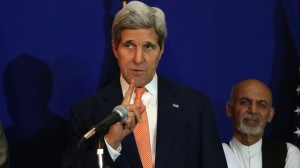US plan on sea dispute not tackled at Asean meet
NAYPYIDAW, Burma—Southeast Asian foreign ministers did not discuss a United States proposal for a freeze on provocative acts in the disputed South China Sea, a senior diplomat said, an apparent setback to US efforts to rein in China’s assertive actions.
Le Luong Minh, secretary general of the Association of Southeast Asian Nations (Asean), said the proposal was not discussed by foreign ministers who met in Burma’s (Myanmar’s) capital on Friday ahead of the Asean Regional Forum (ARF) high-level security dialogue among Asean and key world powers which runs through Sunday.
The diplomats’ talks were overshadowed by maritime tensions, with China’s increased boldness in disputed waters stirring international concern.
Animosity over China’s competing territorial claims with several neighbors is set to loom large over discussions at the ARF on Sunday.
The forum is an annual multilateral security dialogue in the Asia Pacific region, consisting of 27 participants, including the 10-member Asean and key partners, including the US, Australia, China, India, Japan, South Korea, Russia and the European Union.
Asean foreign ministers have expressed concern over tensions in the disputed areas of the South China Sea.
“I asked everyone to see that the situation was getting to a point where it would no doubt begin to affect the peace, security and stability of the region,” said Foreign Secretary Albert del Rosario late Friday.
He said he had urged the regional bloc to call for “a cessation of all activities that escalate tension” in accordance with the existing Asean and Chinese framework to deal with disputes in the contested waters.
Beijing claims sovereignty over almost the entire sea, including waters, islands, reefs, shoals and rocky outcrops nearer to other countries.
Asean states Brunei, Malaysia, the Philippines and Vietnam are claiming parts of the sea, while Taiwan is a sixth claimant.
The US has waded into the row, calling for an end to all “provocative” acts in the South China Sea, a crucial maritime route that is also believed to hold huge oil and gas deposits.
US Secretary of State John Kerry, who arrived in the early hours Saturday to attend the ARF is expected to underline the message during his visit.
Ties between China and Vietnam sunk to their lowest point in decades in May after Beijing moved a deep-sea oil rig into disputed waters near the Paracel islands, triggering deadly anti-China riots in Vietnam.
Beijing has since removed the rig, in a move that analysts say was aimed at deflecting accusations of aggressive maritime behavior.
A draft statement from Asean foreign ministers after the Friday meeting said the 10-member bloc had “serious concern” over recent developments in the disputed sea.
It also called for an end to “destabilizing actions.” That wording is likely to have proved contentious for China’s supporters in Asean and no final statement had been released by early Saturday.
Minh, the Asean secretary general, said the US proposal was not discussed at the Friday meeting because there was already a mechanism in place to curtail actions such as land reclamation and building on disputed islands and reefs.
“It’s not even an issue of Asean supporting or not supporting that proposal,” he told Reuters, noting that China and Asean had already committed to “self restraint” on such action in an agreement signed in 2002.
“It is up to Asean to encourage China to achieve a serious and effective implementation of this commitment,” he said.
The settlement of sovereignty claims in the South China Sea could only be resolved among the parties concerned, according to the top Asean diplomat.
He urged other countries to support Asean by encouraging China to work with it to reach an early conclusion of a Code of Conduct, a proposed plan for rules governing maritime actions.
Kerry had proposed the freeze, marking a significant step-up in US involvement in the dispute.
The unusually strong US stance will add pressure on China to address growing regional concerns and could encourage some Asean nations to push for faster progress on the maritime code aimed at reducing tension.
China accuses the US of emboldening claimants such as the Philippines and Vietnam with its military “pivot” back to Asia.
The Philippines wants a speedy conclusion of talks for a legally binding code of conduct, and the establishment of a dispute settlement mechanism anchored in international law.
The Philippines has been at the forefront of protest against China and has challenged Beijing’s claims before a United Nations tribunal.
It has also protested Chinese reclamation works in disputed reefs, including a suspected airstrip. AFP and AP
RELATED STORY
